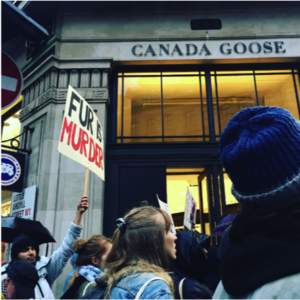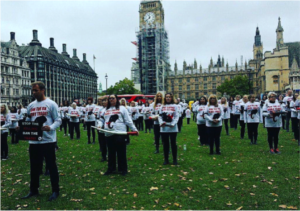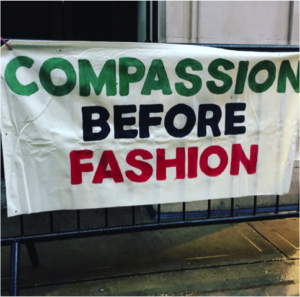It’s time we get real about what’s going on within the fashion industry. Fast fashion, or the low cost, high quantity society we’ve been living in today, has resulted in consumers buying over 400 percent more clothing compared to two decades ago.
Furthermore, high street and luxury brands alike are continuing to abuse humans and animals in the quest to maximize profits.
On Nov. 18, hundreds of animal rights activists from the organization Surge took to the streets of London to protest the opening of a new flagship store, Canada Goose, on the capital’s shopping hub, Regent Street.
The Toronto-born brand is known for their wide range of luxury fur products, coining themselves as “one of the world’s leading makers of luxury apparel.”

Protestors fighting against Canada Goose for animal rights.
However, Canada Goose has been under global scrutiny from PETA, Surge and other animal rights activist groups for the “unethical abuse” against animals, claiming that they are “either shot or bludgeoned to death days after being caught.”
Surrounded by a sizeable police presence, protesters could be heard shouting and holding signs for nearly nine hours, as they carried messages such as “Shame on You,” “Fur Trade, Torture Trade” and “Fur is Murder.”
Similarly, the fourth annual Global March for Elephants and Rhinos took place on Oct. 7, with hundreds of protesters making a silent plea for the elephants and rhinos of Zambia and Zimbabwe and asking the government to stop poaching and end the ivory trade.

Hundreds made a silent plea for The Global March for Elephants.
While these animal rights activists are justly and honorably standing up for the animals that can’t speak for themselves, who is standing up for the millions of people that also don’t have a voice?
According to a study by the U.K. charity, War on Want, nearly 3 million people work in the garment industry in Bangladesh alone, with 80 percent of those people working up to 14 hours a day.
While American and British consumers are buying a cotton T-shirt for $5.99, there are millions of adults and children working for as low as 13 pence (about 18 cents) an hour.
After the 2013 Bangladesh factory collapse that killed over 300 people, the factory supplied a number of fast fashion retailers, such as Primark and H&M. The horrific tragedy sparked a series of protests outside of the U.K.’s favorite fast fashion retailer, Primark.
Despite the abuse and terrible working conditions imposed on its workers, Primark’s revenue has continued to rise from £4.2 billion in 2013 to £5.9 billion in 2016.
So what can we learn from this?
We as consumers need to open our eyes and take a stand against the brutal and unfair treatment of human beings that is far too prevalent within the fashion industry.
It is absolutely crucial for us to become educated on the transparency of the brands we are buying from.
Purchasing one ethical, high-quality garment in lieu of five disposable ones can slowly put a stop to the fast fashion industry that is silently causing extraordinary harm.

Many signs were used to support protests against human and animal abuse.
Feeling as though you want to join the movement but aren’t sure how? Visit http://www.greenpeace.org/international/en/campaigns/detox/fashion/ to join the Detox My Fashion campaign to end the toxic cycle of fast fashion.
